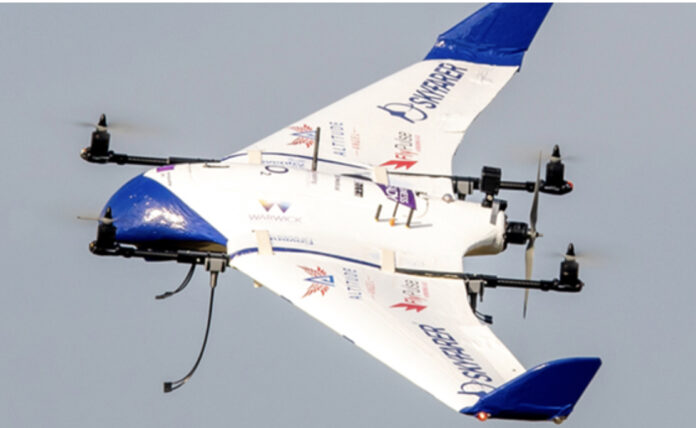The drone delivery trial will last six months, funded by Innovate UK, in the English Midlands.
The Midlands-based consortium is led by Skyfarer and includes O2, Cranfield University, Altitude Angel and Phoenix Wing. The aim is transporting “Covid-19 supplies, pathology samples and blood transfusions delivered via a connected national drone network”.
Smart supply chains
The consortium claims this experimental delivery system will develop smarter, faster, safer and greener supply chains: transportation accounts for 34% of the UK’s net domestic CO2 emissions and heavy goods vehicles make up 17% of domestic transport emissions.
O2 is providing 4G and 5G SIM cards, working with the support of regulator Ofcom.
A similar medical trial was carried out by Deutsche Telekom, working with the university city of Siegen, last summer, and another one for purposes that could include medical supplies and emergency services by Vodafone and Ericsson, also in Germany, later last year.
The UK project has received operational authorisation for extended visual line of sight operations (EVLOS) with an overweight unmanned aircraft system (UAS) from the Civil Aviation Authority, so the consortium can conduct short-range flight demonstrations as part of the project.
They will test the drone’s capabilities for logistics: technology trials will take place after Easter and delivery trials in the summer.
The project is funded by Innovate UK, part of UK Research and Innovation (UKRI), and aims to pave the way for harnessing the power of unmanned aerial vehicles (UAVs) to revolutionise the provision of healthcare services and develop smarter, safer, greener supply chains that have no impact on road congestion and no increase in fossil fuel emissions.
Lifeblood
Some 2.5 million units of blood are processed and distributed in the UK every year. According to the press statement: “The consortium’s drone delivery system promises faster turnaround times on autonomous deliveries, which can be processed at any time and therefore provide a more reliable delivery service to meet supply and processing needs for hospitals and medical hubs around the country.
Phoenix Wings, a German drone manufacturer, is supporting the project by providing a drone with a payload capacity that can meet 97% of vital blood delivery requirements in England.
At the next stage of the project, the consortium will conduct a feasibility study and scoping exercise, which will inform the creation of a drone corridor where UAVs will be able to deliver essential supplies without the need for a human driver. The consortium aims to have fully operational routine medical deliveries taking place by 2022.
Derek McManus, COO at O2, said, “This technology not only has the power to support the healthcare system and save lives, but also reduce emissions usually released by traditional medical delivery transport, helping to build a greener future for Britain.”



